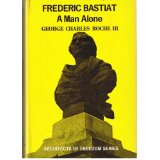Originally published December 31, 2012
Book Review ~ Frederic Bastiat A Man Alone by George Charles Roche III, can be found for under $10.00
As is my habit I scanned the web for book reviews on my subject before beginning to write my own. Sadly, I didn’t find much of anything. I find it sad because the subject of the book, Frederic Bastiat, was a brilliant economist and political theorist that served as a statesman during part of the upheaval occurring in France after its many revolutions. Yes, there was more than one French revolution. I see it’s time for a brief history lesson.
The first French Revolution began in 1789 and was initiated to bump the Bourbon’s off the throne and put the rule in the hands of the people. It managed to do little more than create general chaos which set the stage for a dictator, a Mr. Napoleon Bonaparte. By 1799 he was well on his way to becoming a new empirical force. By 1815, the life of the average Frenchman had changed little. After the Treaty of Paris ended the Napoleonic rule, the French were returned to monarchial rule under another Bourbon, Louis XVIII, brother to the long beheaded king. Back to privileges of property and class and the vast majority of French (70% were peasants) saw little difference between the oppression of the monarchs or that of the “republic.”
Next the French were subjected to the rule of Charles X who started off his “constitutional monarchy” by promoting the “divine right of kings.” He established laws that returned property to the upper classes and made attempts at controlling the press. These actions were only the start of his campaign to regain a firm grip on the country. The French were getting a bit tired of these battles for control of their tax dollars. In the legislative elections of 1830 the king was repudiated. He promptly attempted to dissolve the legislature and make any discussion regarding the authority of the crown illegal. That was the tipping point and the king was invited to leave the country. He did so.
Enter stage right a young man by the name of Alexis de Tocqueville who had studied the French series of revolutions and had spent time in the new American country. He felt that the basis of the whole contest which had raged throughout the land for over 41 years was basically a battle between France’s nobility and her middle class.
This then was the beginning of another cycle of struggle for France and the revolution of 1830 placed a common citizen at the head of a “constitutional monarchy.” Looking for a “citizen king,” Lafayette (as the interim advisor) chose Louis Philippe. This man was a cousin of the Bourbons and a member of the Orleans family. He had royal credentials but was willing to serve as a servant king, dropping robes and froufrou and becoming a monarch “by will of the people.”
Eventually, the whole arrangement was nothing more than a family joke. No one thought highly of “merchants” running amuck in the palace and the “king” certainly got tired of mouthing the words to the revolutionary theme.
This is the political morass that nurtured Bastiat. In the early 1830s he traveled extensively and studied the economic impact on the European states as tariffs and controlling legislation took effect. In 1844 he visited Paris as he was attempting to publish a work on Richard Cobden. Cobden was an English philosopher that believed in the perfectibility of human nature and in the viability of a free trade system. Bastiat, as part of a French free trade movement, submitted his work to Journal des economists. Peer review indicated a clear and quite brilliant mind in the fields economics and political theory. It was obvious to them that the author had a firm grasp on the country’s economic issues. After that, getting published was not a problem and he poured out articles for additional French journals and a book on Cobden.
From that point on Bastiat’s career was a public one. Over the next several years he grew in importance in the French Free Trade movement and became the director of the free trade association. This set the stage for the era of his greatest contributions. He also became a member of the National Assembly during some of the most turbulent years of French history. In a search for stability, leadership in the Assembly chose to try a French form of socialism. A new leader stepped into position in the Assembly, Lamartine.
Lamartine chose to support the working force in the streets of France and try to push something through the Assembly that would finance some kind of job improvement. He wanted the Assembly to finance a national exposition which would employ many people and give them money to spend, thus giving the economy a boost. Bastiat was terrified. He fought back against every measure to further impoverish the country and to provide support to the people without actual output. The socialist elements in the Assembly, however, were determined to employ every Frenchman. Thus something called the “National Workshops” was established based on the premise that there was a “right to employment.”
In 1848 France again suffered revolution as the failing economy demanded that the Assembly “do something” to save the country from bankruptcy. That something was to disband the now powerful National Workshops. Instant revolution and the French again took to the streets and members of the Assembly faced every bit as much danger as the monarchy of old. The country and the Assembly were saved by no less than the French countrymen. From the book, “Men of every class, armed in every conceivable manner, these Frenchmen knew that their country could not stand another triumph of the Parisian mobs.”
And still the struggle continued. Those who would wish to allow the economy to grow on production, and those who would use government to generate the movement of funds to support the starving and failing middle class.
This book is a well written history of the economic and political atmosphere of the time. The prose is interspersed with writings of Bastiat and his compatriots as they argued for their beliefs and their convictions. It is every bit as applicable today as it was then. If you are interested in history, and if you would like a better understanding of the conflicting economic and political ideologies at war in our country today, this is a must read.
I leave you with one of my favorite quotes from Assemblyman Bastiat:
“We see then, that in almost all of the important actions of life we must respect men’s free will, defer to their own good judgment, to that inner light that God has given them to use, and beyond this to let the law of responsibility take its course. “
The law of responsibility–interesting concept, don’t you think? Power corrupts and absolute power corrupts absolutely whether that power is held in the hand of one or many. So, perhaps, government is a search for some balance that works, if not perfectly, at least effectively. By the way, the man in the White House does not have absolute power; he shares it with two other branches of government, the legislative and the judicial. If you are terribly upset with the direction the country is going, or if you see things that you believe might help, I suggest you look at the voting records of the legislature and the decisions of the judiciary every bit as much as you look to the oval office.


No Comments